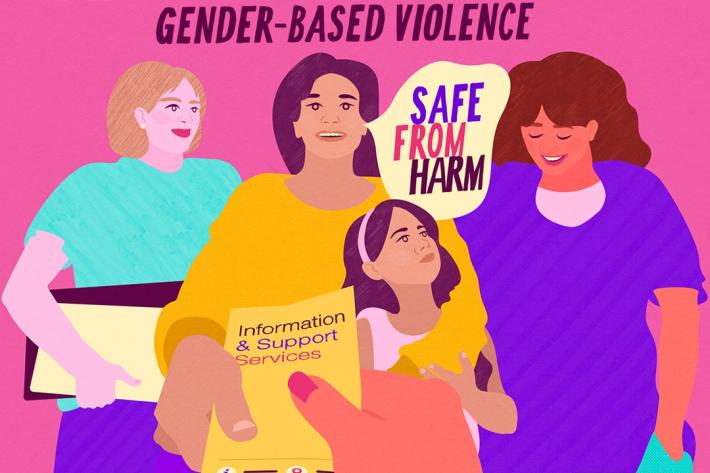Latest press releases
A selection of stories from across the Federation

Poland
Poland: Justyna Wydrzyńska’s Trial to Continue – A Shameful Blow to the Fight for Reproductive Rights
Today, instead of delivering justice, the court prolonged the legal persecution of Justyna Wydrzyńska by ordering a retrial.
For media inquiries


| 23 June 2022
The fight for legal abortion continues in Poland as Parliament rejects the will of the majority of its citizens for liberalisation
We are disappointed by the vote today in the Polish Parliament who rejected a civic initiative bill that would legalise abortion. 265 Members of Parliament voted against the safety, dignity and freedom of Polish women. 66% of Polish people want liberalization of abortion care which means that a small ultra-conservative group is deciding against the will of Polish citizens. Women’s rights organizations and parliament members of the opposition Lewica party collected over 200k signatures for a civic initiative bill, “Legal Abortion Without Compromise,” which would permit abortion without restriction as to reason up to the twelfth week of pregnancy. It would permit abortion after 12 weeks in cases of risk to the person’s mental or physical health, a non-viable pregnancy, or pregnancy resulting from rape or incest. This bill would have protected women and their families and could have avoided cases like Agnieszka's - who died in agony leaving her three children behind when doctors denied her abortion care when she was suffering from an obstetric emergency. Currently, Poland has one of Europe’s most restrictive abortion laws. Together with Malta, it is one of only two European Union Member States that has not legalized abortion on request or broad social grounds. In Poland, abortion is only permitted in situations of risk to the life or health of a pregnant woman, or if a pregnancy results from rape. In practice, however, it is almost impossible for those eligible for a legal abortion to obtain one. Every year thousands of women leave Poland to access abortion care in other European countries, while others import medical abortion pills or seek extra-legal abortion in Poland. Polish women, particularly those in difficult socio-economic situations, have to depend on the crucial help from civil society organizations, with often limited resources. We remain committed to the fight The vote today in the Polish Sejm comes after at the end of 2021 the ‘Stop Abortion’ bill was defeated in the same chamber. This terrifying bill would have imposed prison terms for women and anyone who helps them access abortion, including family members, friends and doctors. This back and forth between progress and regression is reminiscent of the fight for abortion care in Argentina, San Marino and Ireland. There were many votes lost but in the end, women won their right to bodily autonomy. In spite of harassment, legal attacks and intimidation campaigns, Polish women rights defenders stood yesterday in the Parliament, bravely defending the rights of many. They will continue to stand up to forces that want to police women’s bodies even if at risk of imprisonment. Justyna is currently facing jail time for allegedly helping a survivor of domestic violence get abortion pills. Recalling the yesterday’s debate in Parliament, Marta Lempart from the Polish Women's Strike said: “We saw all the hysteria yesterday, the walking out, the tantrums, the shouting, when they saw me speak in the Chamber. The displeasure that they had to listen to what I as a citizen had to say to them. On the other hand, they did everything to have to listen to me once again. Clearly, they have invited me to the Sejm again. Again, they want to meet me, again they want us to see each other there. I am ready."

| 26 January 2022
Regression on Abortion Access Harms Women in Poland
26 January 2022 – One year after the ruling of Poland’s discredited Constitutional Tribunal banning access to abortion in almost all circumstances took effect, its devastating impact on the lives of women and all those in need of abortion care continues. The ruling has increased the extreme barriers women seeking access to abortion face and has had tragic consequences for many of them and their families. Since the ruling took effect on 27 January 2021, more than 1000 women have turned to the European Court of Human Rights in an effort to vindicate their rights, challenging Poland’s highly restrictive abortion law and seeking justice. These groundbreaking cases mark the first direct challenges to be filed before the European Court against Poland’s abortion law and the 2020 Constitutional Tribunal ruling. The applicants claim that the Polish abortion law causes them grave harm and violates their rights to privacy and freedom from torture and other ill-treatment. The Court is expected to begin ruling on some of these cases: K.B. v. Poland and 3 other applications; K.C. v. Poland and 3 other applications; and A.L.- B. v. Poland and 3 other applications. Nine leading international human rights organizations have filed third-party interventions to the European Court of Human Rights in these cases, including Amnesty International, the Center for Reproductive Rights, Human Rights Watch, the International Commission of Jurists (ICJ), the International Federation for Human Rights (FIDH), the International Planned Parenthood Federation European Network (IPPF EN), Women Enabled International, Women’s Link Worldwide, and the World Organisation Against Torture (OMCT). The interventions provide evidence and analysis drawing on international human rights law, comparative European law and guidelines from the World Health Organization. They outline the profound implications that highly restrictive abortion laws have on the lives and health of women and girls of reproductive age.

| 14 January 2022
Poland: A Year On, Abortion Ruling Harms Women
Anniversary Marks Ongoing Assault on Women’s Rights, Rule of Law (Brussels, October 19, 2021) – Women, girls, and all pregnant people have faced extreme barriers to accessing legal abortions in the year since a Constitutional Tribunal ruling virtually banned legal abortion in Poland, 14 human rights organizations said today. Since the ruling, women human rights defenders have also faced an increasingly hostile and dangerous environment. Poland’s authorities should end efforts to undermine reproductive rights and weaken protections from gender-based violence. They should commit to protecting women human rights defenders who have faced ongoing threats and attacks since the October 2020 decision. Escalating death threats since October 9 against Marta Lempart, co-founder of Ognopolski Strajk Kobiet (All-Poland Women’s Strike) and a target of repeated threats for leading demonstrations supporting legal abortion and women’s rights, led to her police protection during public appearances.

| 14 January 2022
Poland debates prison terms for abortion in new blow to women’s rights
The Polish Parliament is set to discuss an anti-abortion bill from a religious ultra conservative group to jail women who access abortion and criminalize anyone who helps them do so, including family members, friends and doctors. The new anti-abortion bill - proposed by Pro - The right to life Foundation - who also put forward a bill two years ago that would criminalize anyone who informs young people about sexuality and relationships - will be discussed in the Polish Parliament's lower chamber during a sitting on 1-2 December. The initiative comes one month after a woman named Izabela - died as a result of Poland’s restrictive abortion law, triggering widespread protests. The bill aims to enshrine extremist doctrine in law by establishing harsh prison terms in cases of abortion. Despite Izabela’s death and the recent protest about the current virtual abortion ban, the bill’s backers would support imprisoning women for up to 25 years for abortion and 5 years in case of miscarriage - considered ‘manslaughter’. The wording of the proposal could even lead to life imprisonment if the pregnant woman were charged with ‘aggravated murder’. In addition to introducing prison sentences, the proposal would remove the remaining, extremely limited, exceptions to the ban which currently allow abortion in cases of rape, incest and endangerment of the women’s life or health. This would further paralyse doctors whose hands are already tied in cases of severe foetal impairment.

| 14 January 2022
Polish Parliament votes on anti-rights bills
Reaction to vote to establish the Polish Institute of Family and Demography IPPF EN is appalled to learn that the lower chamber of the Polish parliament has today given the green light to establish the Polish Institute of Family and Demography. This seemingly innocuous initiative is anything but. It would allow for increased and unnecessary data processing on people’s reproductive health and expanded interference by the state in people’s family lives. Prosecutorial powers would be granted to the Institute’s President, allowing them to interfere in or initiate court and administrative proceedings that fall under the scope of family or children’s rights, such as parental or adoption rights. Polish activists fear this could be used against LGBTQI families by allowing the President to apply for the removal of parental rights from LGBT parents, for example. One look at the track-record of the current presidential-hopeful indicates this fear may be founded: it is Bartłomiej Wróblewski, a PiS MP who submitted the motion to Poland’s Constitutional Tribunal that led to the virtual ban on abortion. The Institute would also be invested with expanded data-processing powers. It would be allowed to “process any information, including personal data, necessary for the performance of its statutory tasks,” although particular attention would be paid to data on marriage and fertility. Again, activists fear that this is an attempt to introduce a system of surveillance on people’s private lives, particularly as it coincides with a recent initiative by the Health Ministry to establish a pregnancy registry, which expands data-gathering on pregnant people. If deemed ‘necessary’ by the Institute, it could process data on pregnancies, contraceptive access, emergency contraception and pregnancy loss. Activists point to how the latter has been used with devastating effect against women in countries with draconian abortion laws, where women who have suffered miscarriage are accused of accessing abortion, and prosecuted.

















